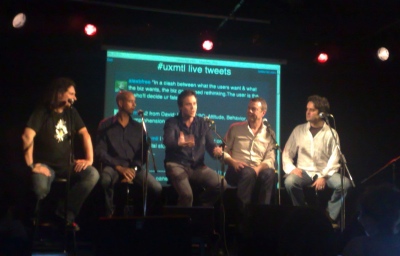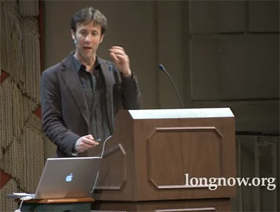By way of the BBC, here’s a look at a device that can help nonverbal autistic children communicate. With powerful, portable computers, applications like this are much more accessible and portable to a wider audience.
All items about humans
It’s common practice today to think that the solution to every problem is to be found in technology. This video is a concept video from the 2009 Challenge your World competition reminding us to not to fall into the trap of that kind of thinking.
Read more »
The secret to Farmville’s popularity is neither gameplay nor aesthetics. Farmville is popular because in entangles users in a web of social obligations. When users log into Facebook, they are reminded that their neighbors have sent them gifts, posted bonuses on their walls, and helped with each others’ farms. In turn, they are obligated to return the courtesies. As the French sociologist Marcel Mauss tells us, gifts are never free: they bind the giver and receiver in a loop of reciprocity. It is rude to refuse a gift, and ruder still to not return the kindness.[11] We play Farmville, then, because we are trying to be good to one another. We play Farmville because we are polite, cultivated people.
This article looks at Farmville, analyzing some of the game’s dynamics and mechanics. It’s a frightening fact that this is the most popular game in the world, but that rather than encouraging creativity or experimentation, the game’s mechanics prey on social obligations, causing players to organize their regular lives around in-game events such as harvesting schedules.
In this video lecture, neuroscientist and fiction writer David Eagleman speaks for two hours about how the Internet, and how humans are connected to it, provides six essential steps to avoid the collapse of civilization. The steps are pretty obvious in retrospect:
- Try not to cough on one another
- Don’t lose things
- Tell each other faster
- Mitigate tyranny
- Get more brains involved in solving problems
- Try not to run out of energy
It’s well presented, reminiscent of James Burke’s Connections and The Day The Universe Changed. Well worth the nearly 2 hours of the lecture.
This short (20 minute) film, “Play”, by David Kaplan and Eric Zimmerman, explores a world where the lines between augmented reality, virtual worlds and computer games have become so blurred that people begin to lose track of reality. Drawing on themes explored by films like The Matrix, Surrogates and Total Recall, this film is fascinating, thought-provoking and just a little disturbing.

Backchannels are all the rage at tech events these days, connecting presenter and audience like never before. They allow audiences to get more value from a presentation by communicating with each other about it. And the audience can feed back to the presenter, which helps him stay on track and know that he is being understood.
But there’s a point where a backchannel goes beyond adding interactivity to an event and begins to undermine the event itself. In November, I witnessed this at the launch of UXMTL, a community for user experience design in Montreal.
Twitter has made setting up backchannels trivially easy — with or without the consent of conference organizers — since anyone can start a Twitter backchannel simply by using a hashtag. Unlike Google Moderator or Backnoise, no specialized software is needed. At UXMTL, the event organisers simply announced that audience members should use the hashtag #uxmtl on Twitter, and all tweets for that tag were displayed on a large screen behind the panelists, using Twitterfall. For me, this completely changed my experience of the event, both as an audience member and a backchannel contributor.







 @
@ Tags:
Tags: 








 Like all images on the site, the topic icons are based on images used under Creative Commons or in the public domain. Originals can be found from the following links. Thanks to
Like all images on the site, the topic icons are based on images used under Creative Commons or in the public domain. Originals can be found from the following links. Thanks to